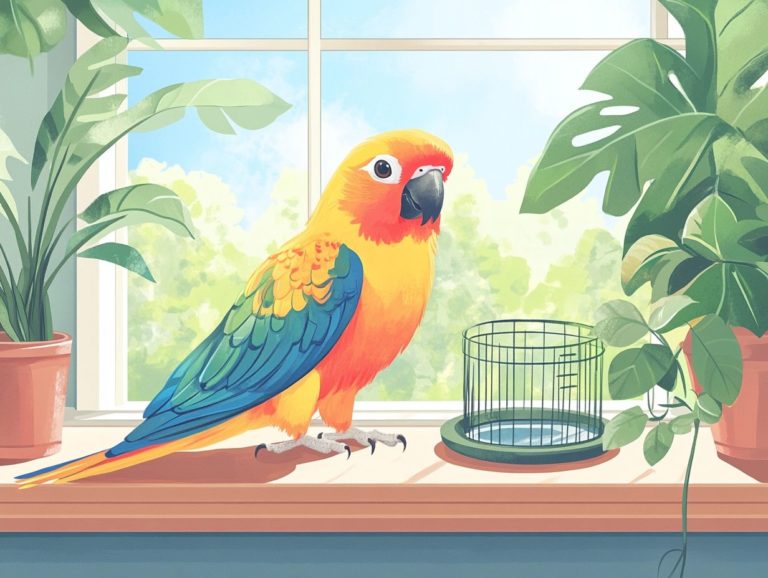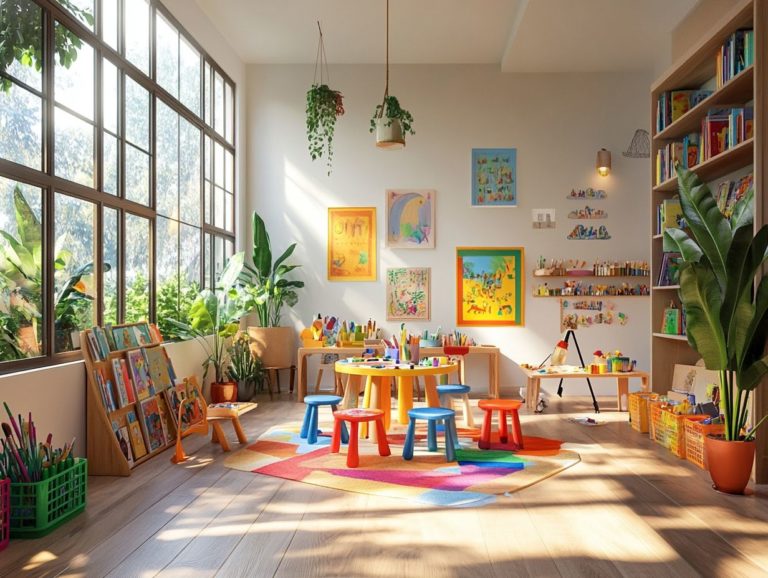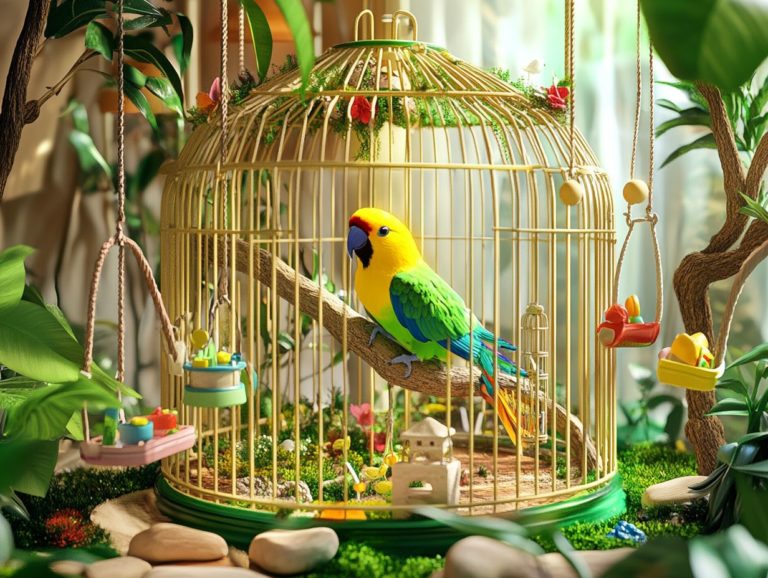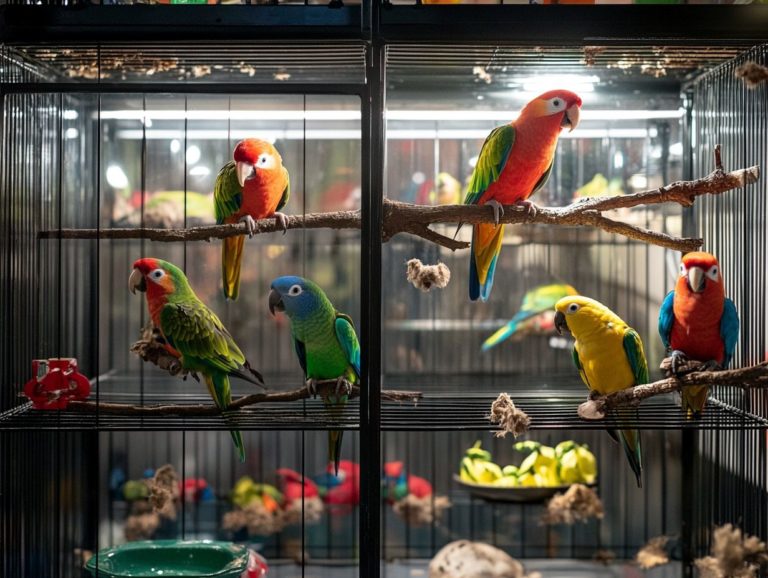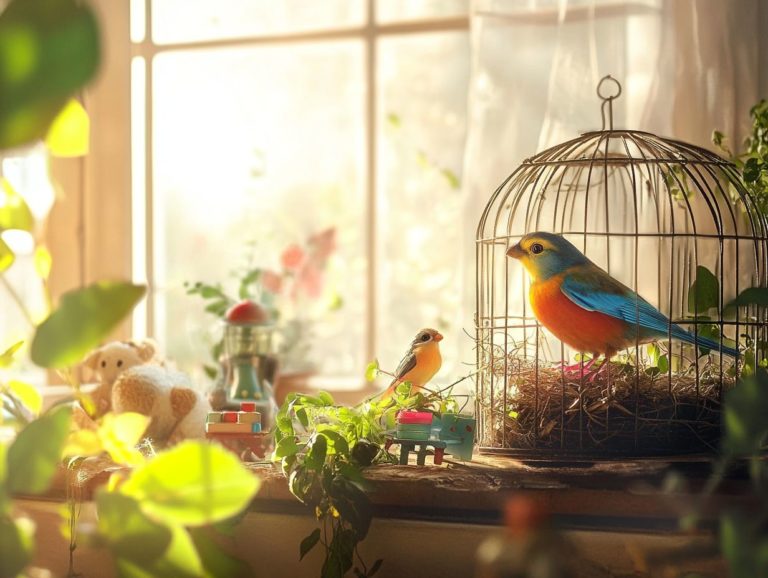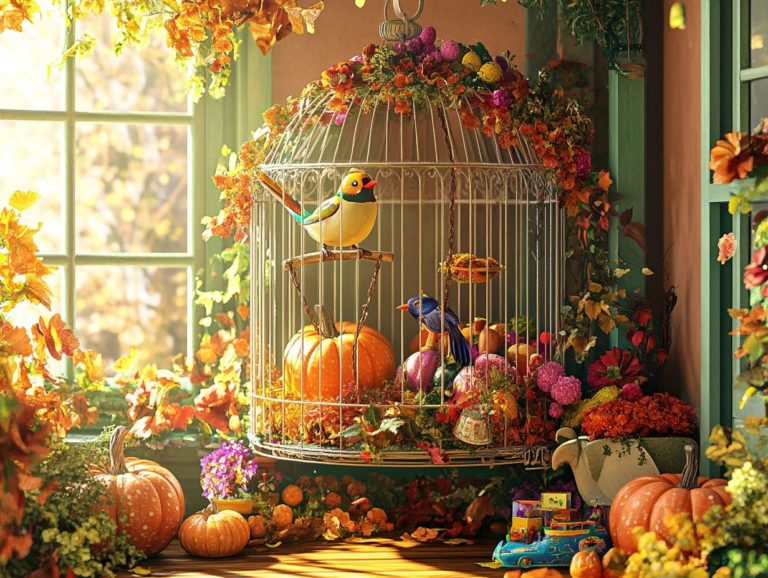The Importance of Natural Light for Birds
Natural light and sunlight are essential for the well-being of birds, influencing everything from their behavior to their overall health.
While you may focus on diet and socialization, it s easy to overlook the importance of natural light.
This article delves into why birds flourish in natural light and sunlight, the negative effects of artificial lighting, and practical ways to create an inviting environment for them.
It will also tackle common misconceptions about light and birds, ensuring you re equipped with the best knowledge for your feathered companions.
Explore how enhancing their habitat can lead to happier, healthier birds.
Contents
- Key Takeaways:
- The Role of Natural Light for Birds
- The Effects of Artificial Light on Birds
- Creating Bright Spaces for Your Birds
- Benefits of Natural Light for Bird Owners
- Common Misconceptions About Natural Light and Birds
- Frequently Asked Questions
- What is the importance of natural light for birds?
- How does natural light benefit birds?
- Can birds thrive without natural light?
- What are the risks of keeping birds in artificial light for extended periods?
- How can natural light improve a bird’s mood and behavior?
- Are there any specific types of natural light that are more beneficial for birds?
Key Takeaways:
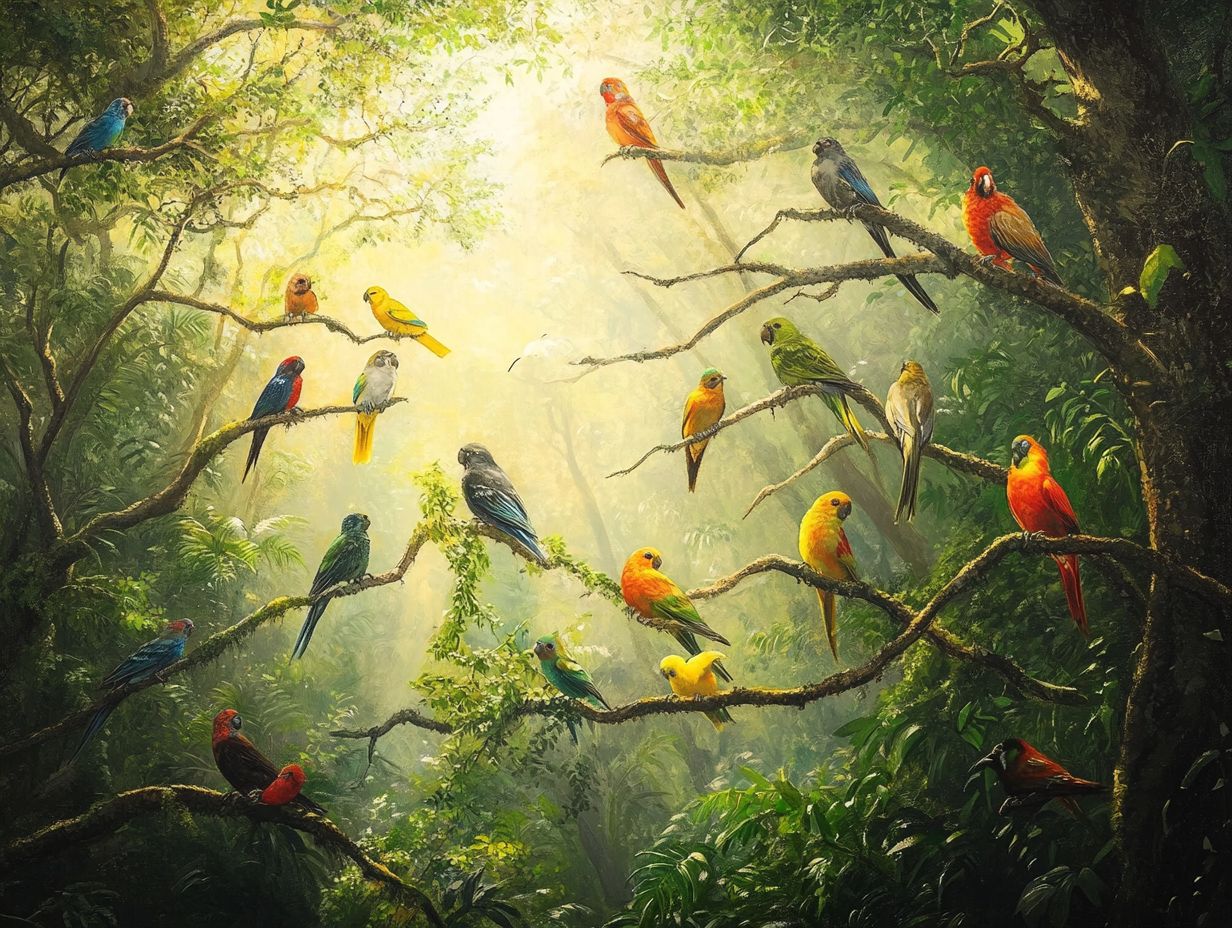
- Natural light is essential for the physical and mental well-being of birds. It provides them with necessary nutrients and helps maintain their natural behaviors.
- Artificial light can have harmful effects on birds. It disrupts their sleep patterns and can lead to health issues. It is important to limit exposure to artificial light and prioritize natural light sources.
- Creating a natural environment with access to sunlight and fresh air is crucial for birds’ overall health and happiness. This can be achieved through proper placement of cages, providing lighting that includes all colors of light, similar to natural sunlight, and incorporating natural elements into their living space.
The Role of Natural Light for Birds
Natural light is vital for the overall well-being and health of birds, especially for captive species like African grey parrots and yellow-collared macaws. When you provide them with exposure to sunlight and full-spectrum light, you re not just meeting their nutritional needs by enhancing vitamin D synthesis; you re also positively influencing their behavior, breeding activity, and weight management.
In today’s fast-paced world, where many pet owners have busy schedules, it s essential to understand the significance of sunlight and outdoor aviaries. This understanding is key to maintaining the health of your avian companions and ensuring their mental well-being while promoting healthy activities.
Why Birds Need Natural Light
Birds thrive when they bask in natural light, which is essential for synthesizing vitamin D. This vital nutrient plays a key role in calcium absorption, crucial for maintaining strong bones and overall avian health.
Sunlight exposure regulates various metabolic processes critical for energy production and maintaining a healthy weight. Natural light and UV rays significantly boost the immune system by enhancing the production of important hormones that help ward off diseases and infections.
By ensuring that birds receive enough sunlight, you can help prevent nutritional deficiencies that may arise from inadequate dietary intake. Sunlight acts as a best friend for these creatures, supporting their physiological functions and significantly contributing to their vitality.
The Effects of Artificial Light on Birds
Artificial light and lighting present various risks to birds, especially when it substitutes natural light. This shift can disrupt their behavioral patterns and negatively impact their mental health, potentially leading to issues such as obesity, heart disease, and other behavioral disorders.
Negative Impacts on Behavior and Health

Artificial light in bird care can greatly affect your pets’ behavior and health. This includes risks like obesity and issues such as feather plucking and Seasonal Affective Disorder.
Prolonged exposure to harsh artificial lighting can lead to increased aggression in pet birds. This may result in territorial disputes and elevated stress levels.
Insufficient lighting can also lead to lethargy and depression, ultimately affecting your birds’ overall mental well-being.
Birds, like many animals, thrive under natural light cycles. Those exposed to disruptive artificial sources may develop Seasonal Affective Disorder (SAD), leading to troubling behaviors like feather plucking or reduced vocalizations.
Give your birds the gift of a balanced lighting environment! It’s key to keeping them happy and healthy companions within the avian community.
Creating Bright Spaces for Your Birds
Providing natural light for birds means creating environments like outdoor aviaries, where they can bask in the sun’s rays. This exposure is vital for their overall health, well-being, and proper physical development.
Tips for Creating a Natural Environment
Creating a natural environment for your birds involves thoughtfully integrating outdoor settings and aviaries that allow for ample sunlight and natural light exposure. This is essential for their health benefits.
By carefully considering the placement of these aviaries, you can maximize your feathered friends’ well-being. Positioning them near windows or in shaded outdoor spots strikes a delightful balance between sunlight and comfort, closely mimicking their natural habitat.
Pick eco-friendly materials for their space. This not only helps the environment but also creates a calm atmosphere that encourages relaxation and healthy habits.
Incorporating plants native to their home regions enhances this setting, creating a more engaging environment. This promotes healthier, happier birds who thrive on the stimulation and sunlight they receive.
Benefits of Natural Light for Bird Owners
Natural light offers significant advantages not only for birds but also for you as a bird owner. It enhances the bond between you and your feathered companions while promoting their overall well-being.
By embracing natural light, you contribute to a thriving avian community, enriching the experience for both you and your pets.
Improving Bonding and Well-being

Improving the bond with your pet birds and enhancing their well-being can be greatly achieved by ensuring they receive plenty of natural light. This exposure plays a crucial role in their overall health.
Not only does natural light stimulate their instinctual behaviors, but it also creates an environment that encourages active play, exercise, and exploration.
As a caregiver, seeing your feathered companions thrive in such conditions can fill you with joy and a deep sense of fulfillment.
By engaging in shared activities like letting them bask in the sun while you enjoy interactive play you can strengthen the emotional connection between you and your pet.
The nurturing rays of sunlight can also elevate your mood, inspiring you to embrace more outdoor activities, which further enhances the bond and promotes a healthier lifestyle for both you and your beloved birds.
Common Misconceptions About Natural Light and Birds
Numerous misconceptions surrounding natural light and birds can lead you to make critical errors in bird care. These misunderstandings may result in vitamin D deficiencies and heightened behavioral disorders in your captive birds.
Let s clear up these myths to help your birds thrive!
Debunking Myths and Misinformation
Debunking myths and misinformation about natural light is crucial for promoting better health in your pet birds and reducing the risk of behavioral disorders.
Many people mistakenly believe that any exposure to artificial light is sufficient for a bird’s well-being. This notion falls short of meeting the needs of pet birds, especially for species like African grey parrots.
Birds thrive on full-spectrum natural light. It helps to regulate their circadian rhythms, which refer to the natural internal processes that regulate the sleep-wake cycle, and aids in synthesizing essential vitamins, especially Vitamin D3.
This vitamin plays a pivotal role in calcium metabolism, directly impacting bone health and overall vitality. This is crucial for preventing heart disease and obesity. Without natural light, your birds may become lethargic and more aggressive. These misconceptions often overshadow the true importance of sun exposure and its benefits for avian health.
Clear up these myths today! Create a vibrant, healthy space for your birds. By addressing these misunderstandings, you can foster happier, healthier pets, ultimately enhancing their quality of life and supporting their dietary habits.
Frequently Asked Questions
What is the importance of natural light for birds?

Natural light is essential for the health and well-being of birds, as it provides vital nutrients like vitamin D. Understanding lighting needs for birds also helps regulate their internal clock and natural circadian rhythms.
How does natural light benefit birds?
Natural light is a source of vitamin D, which is necessary for the production of calcium. It helps maintain strong and healthy bones in birds.
Can birds thrive without natural light?
No, birds need natural light to maintain their physical and mental health. Without it, they may experience nutrient deficiencies, weakened immune systems, and behavioral issues.
What are the risks of keeping birds in artificial light for extended periods?
Exposure to artificial light for extended periods can disrupt the natural sleep patterns of birds and cause stress, leading to health problems and behavioral issues.
How can natural light improve a bird’s mood and behavior?
Natural light helps regulate a bird’s internal clock and promotes a regular sleep-wake cycle. This leads to improved mood and behavior, mitigating the effects of seasonal affective disorder. It also stimulates natural foraging and breeding behaviors in birds.
Are there any specific types of natural light that are more beneficial for birds?
Full-spectrum natural light, particularly full-spectrum bulbs that mimic the wavelengths of sunlight, is the most beneficial for birds. It provides a wide range of essential nutrients such as vitamin D and calcium and helps regulate their biological processes, which include metabolic processes essential for maintaining avian health and proper nutrition.

